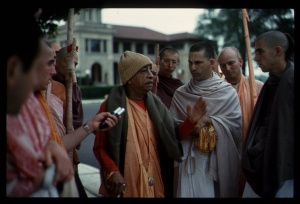CC Madhya 9.316: Difference between revisions
m (1 revision(s)) |
No edit summary |
||
| Line 1: | Line 1: | ||
{{ | [[Category:Sri Caitanya-caritamrta - Madhya-lila Chapter 09|C316]] | ||
<div style="float:left">'''[[Sri Caitanya-caritamrta|Śrī Caitanya-caritāmṛta]] - [[CC Madhya|Madhya-līlā]] - [[CC Madhya 9|Chapter 9: Lord Śrī Caitanya Mahāprabhu's Travels to the Holy Places]]'''</div> | |||
<div style="float:right">[[File:Go-previous.png|link=CC Madhya 9.315|Madhya-līlā 9.315]] '''[[CC Madhya 9.315|Madhya-līlā 9.315]] - [[CC Madhya 9.317|Madhya-līlā 9.317]]''' [[File:Go-next.png|link=CC Madhya 9.317|Madhya-līlā 9.317]]</div> | |||
{{CompareVersions|CC|Madhya 9.316|CC 1975|CC 1996}} | |||
{{RandomImage}} | |||
==== TEXT 316 ==== | ==== TEXT 316 ==== | ||
<div | <div class="verse"> | ||
prabhu āsi’ kaila pampā-sarovare snāna | :prabhu āsi’ kaila pampā-sarovare snāna | ||
pañcavaṭī āsi, tāhāṅ karila viśrāma | :pañcavaṭī āsi, tāhāṅ karila viśrāma | ||
</div> | </div> | ||
| Line 12: | Line 16: | ||
==== SYNONYMS ==== | ==== SYNONYMS ==== | ||
<div | <div class="synonyms"> | ||
''prabhu''—Śrī Caitanya Mahāprabhu; ''āsi’''—coming; ''kaila''—did; ''pampā-sarovare''—in the lake known as Pampā; ''snāna''—bathing; ''pañcavaṭī āsi''—then coming to Pañcavaṭī; ''tāhāṅ''—there; ''karila''—took; ''viśrāma''—rest. | |||
</div> | </div> | ||
| Line 19: | Line 23: | ||
==== TRANSLATION ==== | ==== TRANSLATION ==== | ||
<div | <div class="translation"> | ||
Eventually Śrī Caitanya Mahāprabhu arrived at a lake known as Pampā, where He took His bath. He then went to a place called Pañcavaṭī, where He rested. | Eventually Śrī Caitanya Mahāprabhu arrived at a lake known as Pampā, where He took His bath. He then went to a place called Pañcavaṭī, where He rested. | ||
</div> | </div> | ||
| Line 26: | Line 30: | ||
==== PURPORT ==== | ==== PURPORT ==== | ||
<div | <div class="purport"> | ||
According to some, the old name of the Tuṅgabhadrā River was Pambā. According to others, Vijaya-nagara, the capital of the state, was known as Pampātīrtha. According to still others, the lake near Anāguṇḍi, in the direction of Hyderabad, is Pampā-sarovara. The river Tuṅgabhadrā also flows through there. There are many different opinions about the lake called Pampā-sarovara. | According to some, the old name of the Tuṅgabhadrā River was Pambā. According to others, Vijaya-nagara, the capital of the state, was known as Pampātīrtha. According to still others, the lake near Anāguṇḍi, in the direction of Hyderabad, is Pampā-sarovara. The river Tuṅgabhadrā also flows through there. There are many different opinions about the lake called Pampā-sarovara. | ||
</div> | </div> | ||
__NOTOC__ | |||
<div style="float:right; clear:both;">[[File:Go-previous.png|link=CC Madhya 9.315|Madhya-līlā 9.315]] '''[[CC Madhya 9.315|Madhya-līlā 9.315]] - [[CC Madhya 9.317|Madhya-līlā 9.317]]''' [[File:Go-next.png|link=CC Madhya 9.317|Madhya-līlā 9.317]]</div> | |||
__NOTOC__ | |||
__NOEDITSECTION__ | |||
Revision as of 06:56, 28 August 2021

A.C. Bhaktivedanta Swami Prabhupada
TEXT 316
- prabhu āsi’ kaila pampā-sarovare snāna
- pañcavaṭī āsi, tāhāṅ karila viśrāma
SYNONYMS
prabhu—Śrī Caitanya Mahāprabhu; āsi’—coming; kaila—did; pampā-sarovare—in the lake known as Pampā; snāna—bathing; pañcavaṭī āsi—then coming to Pañcavaṭī; tāhāṅ—there; karila—took; viśrāma—rest.
TRANSLATION
Eventually Śrī Caitanya Mahāprabhu arrived at a lake known as Pampā, where He took His bath. He then went to a place called Pañcavaṭī, where He rested.
PURPORT
According to some, the old name of the Tuṅgabhadrā River was Pambā. According to others, Vijaya-nagara, the capital of the state, was known as Pampātīrtha. According to still others, the lake near Anāguṇḍi, in the direction of Hyderabad, is Pampā-sarovara. The river Tuṅgabhadrā also flows through there. There are many different opinions about the lake called Pampā-sarovara.